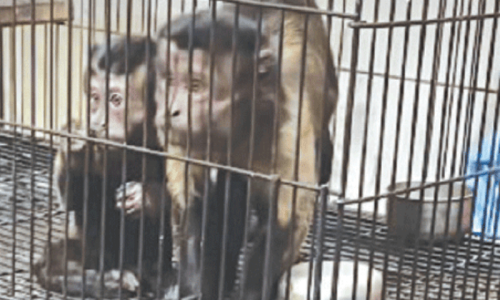Sindh Wildlife Department opposes proposed relocation of illegally imported exotic monkeys to Lahore
The Sindh Wildlife Department (SWD) has formally opposed the proposed relocation of illegally imported exotic monkeys from Karachi to Lahore, calling on the federal government to withdraw its May 8 recommendations and instead follow legal procedures and scientific guidelines.
According to sources, the customs staff had confiscated 26 monkeys — tufted capuchins and marmosets — in January at Karachi airport, being imported by M/s Khayal Enterprises on an alleged fake no-objection certificate (NOC) from South Africa.
In March, the illegal consignment of monkeys, two of which died at the airport while in the custody of customs officials, was handed over to the animal rights organisation Ayesha Chundrigar Foundation (ACF) for want of coordination among government departments.
Per a statement issued by the SWD today, “The department formally opposed the proposed relocation of illegally imported exotic monkeys, urging the government to reconsider the recommendation issued and to instead adhere to due legal process and scientific standards.”
The statement said that in a high-level virtual meeting in April, a technical committee was constituted by the federal secretary of the Ministry of Climate Change to assess the situation and propose recommendations grounded in legality, science, and animal welfare.
The joint report, submitted by the SWD and WWF-Pakistan (Karachi), concluded that relocating the animals to Lahore would “not only be harmful to their health and welfare but would also defy sound scientific reasoning and established legal frameworks,” the statement said.
However, MoCC recommended the transfer to Lahore without consulting the notified committee or reviewing its findings at the agreed forum, it said.
The statement said the SWD expressed serious concerns over the decision, noting that no intimation of the recommendation was provided to the trial court.
“The department emphasised that all wildlife located in Sindh, regardless of origin, enjoys full legal protection under Section 21 of the Sindh Wildlife Protection Act 2020,” the statement said.
“On scientific grounds, the department strongly opposed the transfer of these highly sensitive tropical primates to a facility that lacks adequate species-specific care.”
“The report highlighted that the Lahore-based facility recommended by the federal ministry has previously documented failures in primate care, including inadequate hygiene, poor animal husbandry, limited behavioural enrichment, and a record of animal stress and mortality,” it said, adding that any further relocation would impose another traumatic episode upon the primates and could result in additional fatalities.
“Moreover, there remains an unresolved public health concern as the monkeys were imported through illegal channels and may carry undiagnosed zoonotic pathogens, making their further movement without comprehensive screening a biosecurity risk,” it said.
A study in 2018, compiled through undercover surveys of 55 markets in 23 cities across Pakistan, revealed that a majority of species/animal derivatives on sale at these markets were listed within the Convention on International Trade in Endangered Species and the International Union for the Conservation of Nature’s Red List of threatened species.
The study found that Karachi hosted the highest number of markets and shops dealing in illegal wildlife, followed by Peshawar. The consumption of the dried meat of the Indian cobra and sand lizard was recorded to be widespread in Khyber Pakhtunkhwa and Punjab.













































